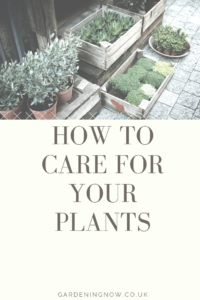Care of your plants is your primary responsibility as a gardener whether your garden is indoor or outside, or large or small.For your plants this is not just a mere question of survival.Things will grow,or may die.Whether they do or not,or if they are to survive and flourish, should not be a matter of chance.You can introduce more certainty with some often simple care steps.Here are some tips.
Caring for your pot plants in your outside container garden
Whether you choose to create your small space garden on a balcony,patio or courtyard area,even one plant in a container can be considered a garden to be looked after and enjoyed.There are a few fundamental things to consider for the proper care of your plants.Three important ones of are:
soil- I use a recommended all purpose potting compost bought from a garden centre which is organic and does not contain added chemicals, but treated so as to deter weeds.The soil needs to be of a consistency that it does not become heavily compacted.A peat based mix will help here.
location – these should be placed where the conditions suit them.For instance, begonias and fuschia prefer shaded areas while geraniums and marigolds just love to be in the full sun.Many grasses are wind tolerant but many other plants are not.
watering – Container plants dry out more quickly than those in a flower bed particularly those in clay pots where the water evaporates quite rapidly.So, it is important to check daily to make sure that they have not dried out.Also,important is to ensure that your plants are not subjected to over waterng.If heavy rainfall has filled any saucers or bases you should empty these to avoid root rot.All your pots should,of course, have drainage holes at the bottom.
Fertiliser – Due to frequent watering, container plants require fertiliser on a more consistent basis then plants in the ground do. Use organic fertilisers such as blood meal, bone meal, or fish emulsion, particularly if the soil is going to be added to the garden at the end of the season, as chemical fertilisers harm the wildlife.
Taking care of your pot plants just requires attention to their basic needs to sustain life.You cannot go wrong if you give thought to where your species of plant came from and its natural environment.For instance, cacti and succulents require little or no watering compared with many annuals.
care for your plants in winter
About this time,in September/October there is some preparation you can carry out to see your plants,shrubs and bushes through the colder days of wintertime.
Preparing your garden for winter – quick tips
-Transplant small annuals and herbs from outside beds into pots for greenhouse or sunny windowsill or balcony.
-as things die-back : rake leaves from the lawn to minimise damage from disease
-remove any plants that looked diseased – do not out into compost
-cut back almost to the ground any unsightly growth perennials –
-autumn weather can dry keep small trees and shrubs watered – prevents damage and preps for growth next spring.
-apply winter mulch shredded leaves to perennials in cold places
-weed to reduce work next spring
-tender wall plants can be protected over winter with straw packed between branches behind netting.
-save summer blooming bulb and tender bulbs eg begonias and dahlias dig up and store in a dry place
caring for your indoor plants
Indoor plants are mainly raised in glass greenhouses in which the air is warm and humid. When brought into the average home, they need to withstand more adverse conditions than the average outdoor plant. Challenging conditions such as minimum light, inadequate ventilation, warmer temperatures, drafts, and dry air contribute to stressful conditions for plants.
Happy gardeningnow!



